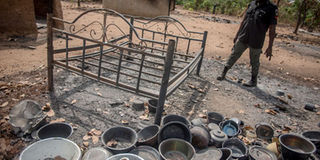In Nigeria's Kaduna, a cry of 'thief' sparks mass murder

A policeman checks the remains of a burned house at Unguwar Busa in Kaduna on February 22, 2019. AFP PHOTO
What you need to know:
- Many accuse Kaduna governor Nasir el-Rufai of adding fuel to the fire. The governor, like his ally President Muhammadu Buhari, is a Muslim from the north.
- In mid-October, a dispute between young Muslims and Christians at the market of Kasuwan Magani resulted in 55 deaths.
Kajuru district in northern Nigeria once boasted a number of bustling villages with Christian farmers of the Adara tribe living side-by-side with Muslim Fulani herders.
But since February 11, it has been a place of desolation.
At the end of several hours of dirt track, the Fulani village of Unguwar Busa, which was previously home to Adara and Fulani camps, is deserted.
All that is left of the round mud huts of the herders are fire-blackened walls. Motorcycle carcasses, burnt cooking pots and the metal skeletons of beds litter the barren landscape.
In a village that was once abuzz with the sounds of people going about their lives, only bird song and cricket chirps pierce the near-deathly silence.
On the eve of presidential elections scheduled for last Saturday but delayed at the last minute, the governor of Kaduna state said 66 people had died in fresh fighting between Adara and Fulani.
A few days later, he adjusted the toll to 130.
The reality is that no-one knows the exact body count, nor what really happened. There are as many versions as there are people in these parts.
According to witness testimonies gathered by AFP, a dozen Adara farmers were killed on February 10 just a few kilometres from Kajuru.
According to pastor Yohanna Buru, this was revenge for the killing of two Fulani nomads "after trespassing on a farm with their herds."
'Living together 50 years'
A day after the Adara killings, attackers armed with traditional rifles and machetes -- their faces masked or painted with charcoal -- burst into Unguwar Busa and a dozen other Fulani encampments.
"We don't know who attacked the Fulani," said Dio Dogora, one of the few remaining inhabitants of the area.
"We have been living together for more than half-a-century. What happened is terrible. Even our own people (Christians) have fled the village."
Husaina Saidu, eight months pregnant, was taken to the hospital at Kaduna with wounds sustained in the attack.
But her biggest pain is not knowing where her husband is.
Is he dead, buried in a mass grave with dozens of other Fulani neighbours still missing?
Shooting everywhere
"They came into our home and started shooting everywhere. In a panic, I saved myself by running away with my children," the 25-year-old said.
Doctors had to extract 13 home-made bullet fragments from the belly of her oldest child, four-year-old Ibrahim.
Stories like these are all too common in Kaduna state, in the midst of a fertile agricultural belt.
The ongoing strife between Muslim herders and Christian farmers, which claimed nearly 2,000 lives in 2018 and displaced hundreds of thousands of others, is a divisive issue for Africa's most populous country of some 190 million people.
And in this highly-religious nation -- made up of a mosaic of more than 200 ethnic groups -- any rumour can prove explosive.
Sensitive to the tinderbox conditions, local police chief Ahmad Abdulrahman refused to be drawn on the death toll.
"It may be more, it may be fewer" than the official tally, he told a press conference.
"In a crisis of this magnitude it is better to await the results of the investigation before giving any figures," he added, in a bid to calm rising passions.
Fuel to the fire
Many accuse Kaduna governor Nasir el-Rufai of adding fuel to the fire. The governor, like his ally President Muhammadu Buhari, is a Muslim from the north.
Both men have been accused of inaction against the Fulani for fear of alienating the Muslim vote -- thus aggravating festering tensions between the two communities, due in part to a land access dispute.
Back in 2011, Kaduna was the scene of devastating electoral violence in which hundreds of Christians were massacred after Buhari lost to Goodluck Jonathan, a Christian.
This time around, both of the main candidates for the presidency are Muslims, and there has been inter-religious violence linked to the campaign at a national level.
But in Kaduna state, a region crushed by mass unemployment, rampant population growth, and extreme poverty, the slightest dispute easily inflames deep-rooted rivalries, which have been intensifying in recent years.
In mid-October, a dispute between young Muslims and Christians at the market of Kasuwan Magani resulted in 55 deaths.
And the trigger?
"All it took was a cry of 'thief!' by someone, and the shots started," recounts Tijani Mohammed Lawal, a local Muslim leader.
"The violence is not new, but previously we managed to settle it between us," he said.
"The problem is that the elders no longer have any control of the young."



